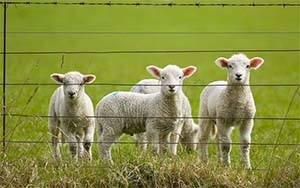
One of New Zealand’s two big meat groups is forecasting a return to profitability this year after two terrible results.
However, the Alliance Group’s continuing existence as a farmer-owned co-operative remains in doubt, after 76 years of being owned by the people who supply its livestock.
That's because the co-operative badly needs capital and needs its farmer-owners to pay the cost, which may not happen.
In case farmers can’t or won’t pay, Alliance has asked Craigs Investment Partners to look for other sources of capital and has met "encouraging interest" from undisclosed international and domestic investors.
A decision on this will come next year, but if it goes ahead, Alliance could emulate its rival, Silver Fern Farms, in which Chinese company, Shanghai Maling became a 50% owner in 2016.
In its latest announcement Alliance revealed a loss after tax of $95.8 million for the year ending 30 September. This compares with a loss of $70.1m last year.
The latest negative result includes one-off post-tax losses of $48.2m, stemming from restructuring costs including redundancies at Alliance's closed Smithfield plant in Timaru.
The underlying loss is $47.6m after tax. Turnover was down to $1.8 billion from $2 billion.
“This is a disappointing financial result for Alliance,” says the chairman of the Alliance Group, Mark Wynne.
“It reflects tough global trading conditions, especially for lamb, which accounts for a high proportion of our portfolio.”
Wynne says Alliance has worked hard to reduce costs, rationalise processing capacity and invest in technology, and is predicting better times.
“The decisive steps we have taken means we have now turned a corner on a tough, two-year period. We’re leaner, more agile and ready to ride the upturn in global red meat pricing. We have seen positive signs in the past few months and we are now forecasting a return to profitability in the current financial year.”
But the Alliance is repeating earlier warnings that it has no choice but to strengthen its balance sheet.
“We understand the burden of asking our farmers to reinvest in difficult circumstances, and we pulled every available lever, including reducing inventory, accelerating global market payments, and cutting operational costs, to ease the pressure,” the annual report says.
“The continued capital raise will enable us to strengthen our balance sheet, manage debt levels, and invest in areas that drive long-term value."
“Ultimately, the future of Alliance depends on the outcome of the capital raise. We have three options: securing capital from farmers and remaining a co-operative, selling part of the company and raising external capital, or selling the company."
“The decision will ultimately rest with our farmer-shareholders.”
One source of unhappiness for Alliance was a sharp fall in meat prices in China, due in part to high-volume, drought-driven sales by Australian farmers. By contrast, there was comparative price stability in the United States and Europe. Beef fared better than sheep meat.
Alliance is pinning its hopes on a range of technical improvements, such as an artificial intelligence (AI) based means of assessing fat levels in lamb and marbling percentages in beef.
Alliance’s annual meeting will be held in Gore on 18 December.
Its rival, Silver Fern Farms, will release its annual report in March. In its last result, Silver Fern Farms lost $10.8m.
2 Comments
The sheep meat industry is failing. In the eighties a national sheep flock over 70 mill, now about 25 mill. Hasn’t been a new plant built since Fortex’s ill fated venture in Mosgiel in the late eighties and a realistic question is at what value the Smithfield plant was previously entered as a fixed asset because once non operational it may well be a liability. Getting underway in the eighties the well managed progression into chilled lamb cuts kept a bit of a life line ongoing, but that market sector is niche, and in a global downturn, it understandably shrinks and anyway, only about 33% of the carcass provides the requisite final product. In a likely unforeseen irony Silver Fern Farms stronger position is most likely due to the rancorous and unwelcome takeover of Richmond’s in the North Island and the resultant capture of beef processing. Would suggest that feature is largely carrying the balance sheet. Perhaps another way out of this is for Silver Fern to absorb Alliance and undergo a further rationalisation of plant capacity vis a vis stock numbers.
No ROI on this investment...... Tough times ahead.

We welcome your comments below. If you are not already registered, please register to comment
Remember we welcome robust, respectful and insightful debate. We don't welcome abusive or defamatory comments and will de-register those repeatedly making such comments. Our current comment policy is here.